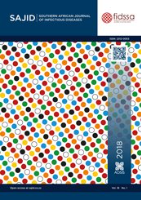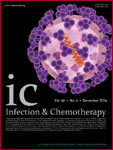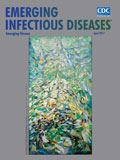
Southern African Journal of Infectious Diseases
Scope & Guideline
Connecting knowledge to combat infectious diseases.
Introduction
Aims and Scopes
- Infectious Disease Epidemiology:
Research on the patterns, causes, and effects of infectious diseases in populations, particularly in Southern Africa, focusing on emerging and re-emerging infections. - Clinical Management and Treatment Protocols:
Studies aimed at evaluating and improving treatment strategies for various infectious diseases, including HIV, tuberculosis, and other prevalent infections. - Microbial Resistance and Antimicrobial Stewardship:
Investigations into antimicrobial resistance patterns and the implementation of stewardship programs to optimize antibiotic use and mitigate resistance. - Public Health Interventions:
Research on the effectiveness of vaccination programs, outbreak responses, and health education initiatives to control infectious diseases. - Diagnostic Innovations:
Development and evaluation of novel diagnostic tools and techniques for early and accurate detection of infectious diseases. - Pathogen Characterization and Laboratory Studies:
Studies aimed at understanding the microbiological profiles of infectious agents, their resistance mechanisms, and the implications for treatment.
Trending and Emerging
- COVID-19 Research:
There has been a significant increase in studies related to COVID-19, including clinical outcomes, vaccine hesitancy, and public health responses, reflecting the ongoing global pandemic's impact. - Mental Health Implications of Infectious Diseases:
Emerging research highlights the psychological effects of diseases like tuberculosis and HIV, particularly among patients, indicating a growing recognition of the importance of mental health in disease management. - Innovations in Antimicrobial Stewardship:
Research focusing on effective antimicrobial stewardship practices is on the rise, aiming to combat antimicrobial resistance through better prescribing practices and education. - Paediatric Infectious Diseases:
An increasing focus on infectious diseases affecting children, including HIV management and vaccination strategies, emphasizes the need for tailored interventions in this vulnerable population. - Global Health and Cross-Border Health Issues:
Emerging themes also include studies addressing health issues across borders, including the spread of infections and collaborative public health strategies in Southern Africa.
Declining or Waning
- Traditional Infectious Disease Models:
Research utilizing classical models of infectious disease spread and control has decreased, likely due to the emergence of more complex and adaptive models that incorporate social, environmental, and behavioral factors. - Focus on Non-Communicable Diseases:
There appears to be a waning interest in examining the intersections between infectious diseases and non-communicable diseases, as the journal increasingly prioritizes infectious disease research. - Historical Epidemiological Studies:
The trend of publishing retrospective studies on historical outbreaks or infections seems to be declining, as researchers focus more on current and emerging threats.
Similar Journals

Journal of Infection in Developing Countries
Innovating public health strategies for a brighter future.Journal of Infection in Developing Countries, published by J INFECTION DEVELOPING COUNTRIES, is a premier open-access journal dedicated to advancing research in the fields of infectious diseases, microbiology, parasitology, and virology, particularly within the context of developing nations. Established in 2007 and actively disseminating knowledge since 2008, this journal aims to bridge the gap between researchers and practitioners by providing a platform for high-quality, peer-reviewed articles that address the unique challenges faced in these regions. With an ISSN of 1972-2680 and a robust HIndex showcasing its growing influence, JIDC has attained a Q3 category ranking in several disciplines as of 2023, indicating its crucial role in shaping ongoing discourse in public health. As an open-access publication, it ensures that vital research is accessible to all, fostering collaboration and innovation in infectious disease management and control.

Infection and Chemotherapy
Innovative Insights into Infection Management and TherapyInfection and Chemotherapy, an esteemed journal published by the Korean Society of Antimicrobial Therapy, focuses on the dynamic fields of infectious diseases and pharmacology. With an ISSN of 2093-2340 and an E-ISSN of 2092-6448, this peer-reviewed, open-access journal has been providing a crucial platform for research dissemination since 2008. Based in South Korea, it boasts a significant impact in the academic community, as evidenced by its Q2 ranking in both Infectious Diseases and Pharmacology categories for 2023. It holds a Scopus rank of 64 out of 272 in Pharmacology and 98 out of 344 in Infectious Diseases, showcasing its prominence and the quality of research it publishes. With a focus on advancing scientific knowledge, Infection and Chemotherapy is committed to fostering essential dialogues among researchers, clinicians, and students, making it a vital resource for those engaged in the fight against infectious diseases and the development of effective therapeutic protocols.

Infectious Diseases Now
Connecting researchers to combat infectious challenges.Infectious Diseases Now is a premier academic journal dedicated to the evolving field of infectious diseases, published by Elsevier France - Éditions Scientifiques Médicales Elsevier. With an ISSN of 2666-9927 and an E-ISSN of 2666-9919, this journal stands at the forefront of disseminating critical research and clinical insights from 2021 to 2024. The journal's commitment to open access means that groundbreaking studies are readily available to researchers, healthcare professionals, and students, fostering a collaborative approach to tackling global health challenges. As evidenced by its Q2 quartile ranking in the 2023 Scopus category of Infectious Diseases, and its impressive position within the top 25% of its field, Infectious Diseases Now serves as an essential resource for those involved in the study and management of infectious diseases. By publishing high-quality research, case studies, and reviews, the journal plays a pivotal role in advancing knowledge and improving patient care in this vital area of medicine.

IJID Regions
Bridging research and policy for enhanced health outcomes.IJID Regions is a pioneering open access journal published by Elsevier, focusing on the critical fields of epidemiology, infectious diseases, and public health. Established in 2021, the journal aims to provide a platform for disseminating high-quality, innovative research that addresses pressing health issues and informs evidence-based practices in communities around the globe. With its impact factors reflecting a Tier Q2 and Q3 ranking in various medical subcategories on the Scopus platform, IJID Regions is positioned as a valuable resource for researchers, health professionals, and policy-makers striving to enhance public health outcomes. This journal not only champions open access since its inception, promoting the free flow of information, but also welcomes contributions that shed light on contemporary challenges in environmental and occupational health. Its commitment to fostering dialogue and collaboration in the health sciences is paramount, making it an essential read for those engaged in advancing public health knowledge and initiatives.

Infectious Diseases and Clinical Microbiology
Bridging research and clinical practice in infectious health.Infectious Diseases and Clinical Microbiology is a pivotal journal dedicated to advancing our understanding of infectious diseases through rigorous scientific research and clinical practices. Published by DOC DESIGN INFORMATICS CO LTD, this journal serves as a vital platform for researchers, healthcare professionals, and students keen on enhancing their knowledge of microbiological sciences and the clinical implications of infectious agents. With an ISSN of 2667-646X, it aims to disseminate significant findings in the field, enriching the scholarly dialogue surrounding infectious diseases. While currently operating under a traditional access model, the journal encourages global collaboration and knowledge sharing, striving to make a meaningful impact in tackling the challenges posed by infectious diseases. Its content aims to bridge the gap between laboratory research and clinical application, making it an essential resource in the contemporary landscape of global health.

Journal of Global Infectious Diseases
Transforming research into impactful health strategies.Journal of Global Infectious Diseases, published by Wolters Kluwer Medknow Publications, serves as a pivotal resource in the field of infectious diseases, offering insightful research and critical analyses that contribute to global health discourse. Since its inception as an Open Access journal in 2009, it has aimed to disseminate knowledge on various facets of infectious diseases, fostering collaboration among researchers, clinicians, and public health professionals. With an impact factor indicative of its growing significance—ranked in the Q3 category of Infectious Diseases for 2023—this journal publishes a diverse range of studies, from basic science to clinical applications. Its dedicated contributions help address pressing health challenges and enhance knowledge sharing in an era where infectious diseases pose significant threats worldwide. Based in India, the journal not only highlights regional health issues but also connects to the broader global landscape, making it an essential platform for anyone interested in advancing the field.

EPIDEMIOLOGY AND INFECTION
Fostering Knowledge for Global Health ChallengesEPIDEMIOLOGY AND INFECTION is a premier open-access journal published by Cambridge University Press, dedicated to advancing the field of epidemiology and infectious diseases. With an ISSN of 0950-2688 and E-ISSN of 1469-4409, this journal has been at the forefront of disseminating impactful research since its inception in 1970. As of 2023, it holds a prestigious Q2 ranking in both the fields of Epidemiology and Infectious Diseases, reflecting its significant contribution to these critical areas of study, with Scopus rankings placing it at #70 in Epidemiology and #163 in Infectious Diseases. The journal aims to publish high-quality, peer-reviewed studies that contribute to our understanding and management of infectious diseases globally. Operating under an open-access model since 2020, EPIDEMIOLOGY AND INFECTION ensures that research is accessible to a wide audience, fostering collaboration and innovation among researchers, professionals, and students alike. With a commitment to excellence, this journal is an essential resource for those looking to stay abreast of the latest developments in epidemiological research and infectious disease management.

GERMS
Empowering practitioners with vital insights in epidemiology.GERMS is a multidisciplinary journal published by the EUROPEAN ACAD HIV-AIDS & INFECTIOUS DISEASES, dedicated to advancing knowledge in the fields of epidemiology, immunology, infectious diseases, and microbiology. Since its inception in 2011, the journal has provided a crucial platform for researchers and practitioners to share innovative studies, clinical findings, and public health insights, with an eye on improving health outcomes globally. With an ISSN of 2248-2997 and a consistent publication trajectory leading up to 2024, GERMS is recognized in the third quartile across several categories, reflecting its growing impact and relevance in the scientific community. Authors and readers benefit from a range of access options, fostering the dissemination of vital research findings. As a journal situated in Romania, it also addresses regional health challenges while contributing to the broader discourse on infectious diseases and public health. GERMS is not just a repository of knowledge, but a vital resource for those engaged in combating infectious diseases and promoting health equity.

BMC INFECTIOUS DISEASES
Leading the charge in infectious disease scholarship.BMC Infectious Diseases is a premier open-access journal published by BMC in the United Kingdom, dedicated to the field of infectious diseases. Established in 2001, this journal has been at the forefront of disseminating high-quality, peer-reviewed research, contributing significantly to the global understanding of infectious pathogens and their impact on public health. With a 2023 Scopus ranking of #100 out of 344 in the Medicine - Infectious Diseases category, and a notable Q1 quartile classification, it stands as a vital resource for researchers and professionals alike. Authors benefit from the journal's broad reach and visibility, ensuring their work is accessible to a wide audience. Access options are fully open, allowing for seamless dissemination of knowledge in the ongoing battle against infectious diseases. With an established history of publishing groundbreaking studies, BMC Infectious Diseases plays a crucial role in addressing critical issues and advancing research in the ever-evolving landscape of infectious diseases.

EMERGING INFECTIOUS DISEASES
Advancing the Frontlines of Infectious Disease ResearchEmerging Infectious Diseases, published by the Centers for Disease Control and Prevention, is a leading open-access journal that has been dedicated to the field of epidemiology, infectious diseases, and medical microbiology since its inception in 1995. With an impressive impact factor placing it in the Q1 quartile rankings for multiple categories including Epidemiology, Infectious Diseases, and Medical Microbiology, this journal serves as a vital resource for researchers, practitioners, and students dedicated to combating the challenges posed by emerging infectious diseases. The journal's distinguished Scopus ranks further highlight its global influence, ranking #10 in Epidemiology, #26 in Infectious Diseases, and #13 in Medical Microbiology, all within the top percentiles. Accessible and targeted, Emerging Infectious Diseases publishes seminal research and reviews that contribute to the understanding and management of infectious diseases, ensuring that critical insights reach a broad audience. The journal encourages contributions that advance the scientific community’s knowledge and responses to public health challenges.